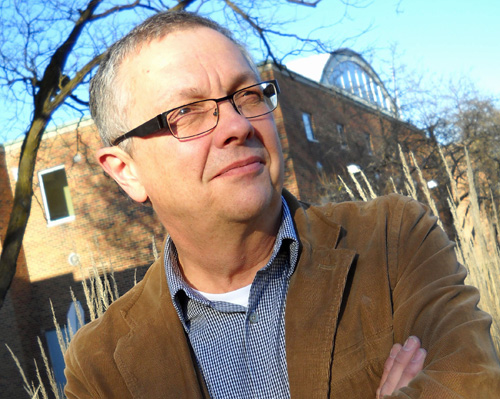
Is your research or teaching helping to make this a greener world? Maurice Nelischer wants to hear from you. As U of G’s recently appointed director of sustainability, he’s building connections among faculty and staff members to help the University meet recommendations of the 2010 President’s Task Force on Sustainability.
Appointed to the new position in September, Nelischer is planning initiatives to highlight sustainability issues on campus, including a number of projects to begin early in 2012.
He’s occupying an office in the Landscape Architecture building, down the hall from his previous office where he was director of the School of Environmental Design and Rural Development. Nelischer retired earlier in 2011; in the fall, he was named professor emeritus. As sustainability director, he now reports to Kevin Hall, vice-president (research).
Encouraging sustainability in teaching and research complements campus-wide initiatives led by Gillian Maurice, sustainability co-ordinator within the Department of Physical Resources. Her office provides sustainability information and encourages faculty, staff and students in green initiatives, including energy conservation, recycling and waste management.
Focusing on teaching and research, Nelischer is considering several new projects on campus, including the following:
Sustainability fund: Based on a set donation every time faculty and staff members travel by air for work or leisure, this voluntary fund might help pay for green research or teaching initiatives. Examples include a new environmental course module or distance course; a research project involving social marketing; sustainable art or artworks about sustainability.
Sustainability website: To be launched in early 2012, the website will share examples of sustainability initiatives in teaching and research at U of G and on other university campuses.
Sustainability certificate: A new sustainability certificate open to all undergrads will include a core course on sustainability and will involve faculty across campus. This certificate will also draw upon current green-themed courses such as “Global Environmental Change,” “Gender and the Environment,” and “Society and the Environment.”
SEETalks: A planned seminar series called SEETalks (Social, Environmental, Economic) will allow faculty members to discuss how their work helps improve sustainability.
Awareness campaign: Nelischer will launch a sustainability awareness campaign in February called “Are You Sure?”
He also hopes to encourage faculty to find other ways to bring sustainability into the classroom, and wants to include sustainability in the University’s learning objectives.
As the University’s sustainability director, he works with a new advisory committee, including representatives from Hospitality Services, Physical Resources, the Department of Geography, the Ontario Agricultural College, and the College of Management and Economics (CME).
Sustainability means more to Nelischer than championing the blue box. In fact, he says, “Recycling alone is not a good thing.” Besides using energy, the practice may instill false complacency. “Reduce” and “reuse” are more vital parts of the equation: “Recycling should be there, but we have to step up our contribution.”
That might surprise the roughly four out of five members of the campus community polled by last year’s task force who believe that sustainability equates to recycling.
Besides the three R’s, there’s another triad that Nelischer wants to stress in his new role – and one that drove creation of the task force. That group’s goal was to ensure that the University’s teaching, research and operations reflect its commitment to environmental, social and economic sustainability.
“We need all three for a better quality of life. A world without a vibrant economy is not sustainable,” says Nelischer.
For instance, he might argue that he’s saving resources by keeping his 20-year-old Volvo on the road rather than buying a new vehicle. But that ignores the economic benefits of car-assembly jobs and automobile taxes that might help pay for societal needs. “I might be doing one good thing for the environment but nothing for the other two pillars of sustainability.”
Accounting for all three areas will help to set apart U of G initiatives from sustainability efforts at other institutions focused only on environmental benefits. He says the idea is echoed in a CME project with The Co-operators in Guelph that teaches business students about community engagement and sustainability.